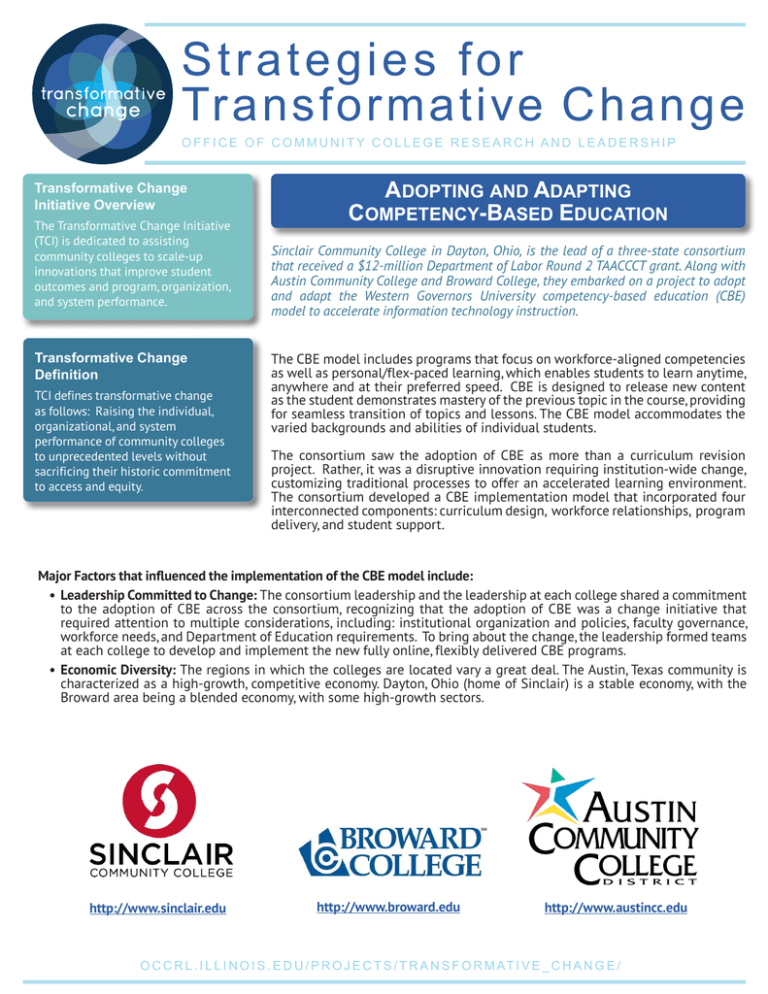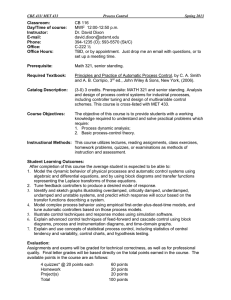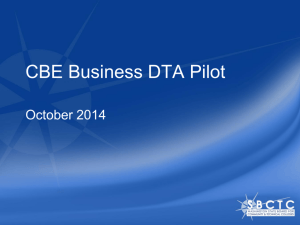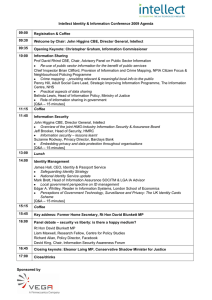Strategies for Transformative Change A
advertisement

Strategies for Transformative Change OFFICE OF COMMUNITY COLLEGE RESEARCH AND LEADERSHIP Transformative Change Initiative Overview The Transformative Change Initiative (TCI) is dedicated to assisting community colleges to scale-up innovations that improve student outcomes and program, organization, and system performance. Transformative Change Definition TCI defines transformative change as follows: Raising the individual, organizational, and system performance of community colleges to unprecedented levels without sacrificing their historic commitment to access and equity. Adopting and Adapting Competency-Based Education Sinclair Community College in Dayton, Ohio, is the lead of a three-state consortium that received a $12-million Department of Labor Round 2 TAACCCT grant. Along with Austin Community College and Broward College, they embarked on a project to adopt and adapt the Western Governors University competency-based education (CBE) model to accelerate information technology instruction. The CBE model includes programs that focus on workforce-aligned competencies as well as personal/flex-paced learning, which enables students to learn anytime, anywhere and at their preferred speed. CBE is designed to release new content as the student demonstrates mastery of the previous topic in the course, providing for seamless transition of topics and lessons. The CBE model accommodates the varied backgrounds and abilities of individual students. The consortium saw the adoption of CBE as more than a curriculum revision project. Rather, it was a disruptive innovation requiring institution-wide change, customizing traditional processes to offer an accelerated learning environment. The consortium developed a CBE implementation model that incorporated four interconnected components: curriculum design, workforce relationships, program delivery, and student support. Major Factors that influenced the implementation of the CBE model include: • Leadership Committed to Change: The consortium leadership and the leadership at each college shared a commitment to the adoption of CBE across the consortium, recognizing that the adoption of CBE was a change initiative that required attention to multiple considerations, including: institutional organization and policies, faculty governance, workforce needs, and Department of Education requirements. To bring about the change, the leadership formed teams at each college to develop and implement the new fully online, flexibly delivered CBE programs. • Economic Diversity: The regions in which the colleges are located vary a great deal. The Austin, Texas community is characterized as a high-growth, competitive economy. Dayton, Ohio (home of Sinclair) is a stable economy, with the Broward area being a blended economy, with some high-growth sectors. http://www.sinclair.edu http://www.broward.edu http://www.austincc.edu O C C R L . I L L I N O I S . E D U / P R O J E C T S / T R A N S F O R M AT I V E _ C H A N G E / Adopting and Adapting Competency-Based Education Strategies for Transformative Change SStrategy Description: Significant Aspects of the CBE Implementation This section provides details on how the four components of the CBE model were uniquely implemented at Sinclair, Austin, and Broward. Curriculum Redesign All three colleges converted existing AAS information technology degree programs for CBE delivery. Using state and industry standards, Sinclair mapped competencies, identified gaps and overlaps, then updated the curriculum to align with their respective standards. Instructional designers were hired or assigned to collaborate with faculty in the development of the CBE courses. In addition, there is a move at all three colleges to “chunk” course content to help students make more steady progress. The changes include compressing multiple courses that lead to a certificate into a single course with modules covering required competencies, or implementing fewer units within course modules. Workforce Partnerships All three colleges developed formal relationships with industry partners. At each college, dedicated staff members engage employers with the CBE program. Recognizing the unique economic needs of each region, the type and level of partner involvement and the partnership objectives vary across colleges. Austin is located within a high growth economic market and has engaged with over 100 community and industry partners. Partners provide feedback on course or program content, co-sponsor recruiting events, participate in job fairs and mock interviews, and help connect students to jobs. Broward is located in a blended economic region with a mix of stable and high growth industry sectors. While BC did not originally include an employer engagement position as part of their grant, by November 2014 they had seen the usefulness of this position at the other consortium schools, and moved forward to develop the position and hire an industry partner coordinator. In Dayton, the presence of a mature economic development network enabled Sinclair to create a regional Stakeholder Collaborative Framework with a goal of ensuring the alignment of CBE programs with labor market needs. This Stakeholder Collaborative engages employers, workforce agencies, recruiting agencies, and other constituencies to examine existing employment data and to provide local input. Program Delivery CBE delivery requires flexible entry and completion of courses, which appeared incongruent with existing semester-based systems. A semester-compatible flexiblestart system was designed and integrated into existing course scheduling, staffing, and financial aid processes at each school. Sinclair worked with financial aid colleagues to define “mini-terms” within the existing system to accomodate the accelerated personal/flex-paced model. Flexible starts are integrated into the semester calendar with sections starting every Monday for the first 12 weeks of the term. A single “teaching” section is automatically populated from the 12 registration sections, allowing students and faculty to interact in the same section, regardless of enrollment date. Austin delivers their course in 8 and 16-week terms, and allows students to proceed through the courses at their own pace. Broward integrated the flexible start CBE program delivery into their existing “out of synch” term system. Student Support Implementation of the CBE model included new processes for both recruiting and supporting students. Prospective students are required to demonstrate computer literacy and complete an orientation. At Austin, the department chairs screen prospects, while Broward and Sinclair use admissions staff. At Sinclair the orientation is offered online, while Austin and Broward conduct in-person orientation sessions. Academic Coaches were hired to provide students with support in the flexible paced program. At Sinclair, the coaches built upon their existing online student case management system, Student Success Plan. Coaches monitor student progress through weekly course activity reports and partner with faculty to provide support to students when needed. At Austin and Broward, the coach acts largely as an enrollment manager and progress monitor. Austin did not originally plan to include coaches, but concluded early in the grant period that the role was needed. The Broward model has evolved from the original faculty advisors to a model where academic coaches guide students through enrollment and courses. This document is part of a series from TCI describing selected strategies employed in the TAACCCT consortia. TCI is funded by the Bill & Melinda Gates Foundation, Lumina Foundation, and the Joyce Foundation. TCI is led by OCCRL at the University of Illinois at Urbana-Champaign, and The Collaboratory, LLC. Dr. Debra Bragg, professor and director of TCI at OCCRL, and Ms. Mindy Feldbaum, CEO of the Collaboratory, provide the leadership and support for the TCI Network and its affiliated partners and consultants. © 2015 University of Illinois Board of Trustees Suggested citation: Thibeault, N., Amato, C., Siefert, D., & Richie, D. (2015). Strategies for transformative change: Adopting and adapting competency-based education. Champaign, IL: Office of Community College Research and Leadership, University of Illinois at Urbana-Champaign.




